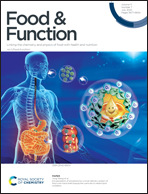Effect of enzyme immobilization and in vitro digestion on the immune-reactivity and sequence of IgE epitopes in egg white proteins†
Abstract
The effects of hydrolysis by free and immobilized forms of Neutrase (FN, IN, respectively) and Thermolysin (FT, IT, respectively) and in vitro digestion on the degree of hydrolysis (DH) of egg white proteins, molecular weight distribution of peptides, immune-reactivity and IgE epitopes of egg white proteins were investigated. With FT and IT in the intestinal digests, the proteolysis followed by in vitro digestion produced peptides smaller than 10 kDa. Hydrolysis with the immobilized enzymes had a greater effect than the free enzymes on increasing surface hydrophobicity. The lowest IgE-binding capacity was observed for the intestinal digest of IT-derived hydrolysates (3.3 ± 1.9%). Compared to in vitro digestion, proteolysis showed a significant effect on the immune-reactivity reduction of egg white proteins. Liquid chromatography-tandem mass spectrometry data showed that the most resistant epitopes to enzymatic hydrolysis and in vitro digestion were in ovomucoid, where epitope fragments 1–10, 1–14, 1–20, 4–20, 11–20, 61–74, 71–75 and 101–105 remained intact. Overall, the IgE-binding capacities of egg white proteins were not completely removed after the enzymatic hydrolysis and in vitro digestion due to the presence of intact proteins such as lysozyme and also due to the several immunoreactive peptides derived from egg white proteins.



 Please wait while we load your content...
Please wait while we load your content...